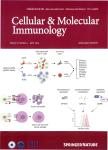Enhancing the HSV-1-mediated antitumor immune response by suppressing Bach1
作者机构:Institute of Basic Medical Sciences Chinese Academy of Medical SciencesSchool of Basic Medicine Peking Union Medical College100005BeijingChina Suzhou Institute of Systems MedicineSuzhou215123JiangsuChina Institute of Systems MedicineChinese Academy of Medical Sciences&Peking Union Medical College100005BeijingChina The Second Affiliated HospitalZhejiang University School of Medicine310009HangzhouChina Heze Vocational College274008HezeChina Affiliated Tumor Hospital of Nantong University226000NantongChina Department of DermatologyUniversity of Pittsburgh Medical Center3708 Fifth AvenueSuite 500.68PittsburghPA15213USA Key Laboratory of Carcinogenesis and Translational Research(Ministry of Education/Beijing)Department of Bone and Soft Tissue TumorPeking University Cancer Hospital&Institute52 Fucheng Rd100142BeijingChina Department of Molecular and Medical Pharmacology and California NanoSystems InstituteUniversity of CaliforniaLos AngelesLos AngelesCA90095USA
出 版 物:《Cellular & Molecular Immunology》 (中国免疫学杂志(英文版))
年 卷 期:2022年第19卷第4期
页 面:516-526页
核心收录:
学科分类:1002[医学-临床医学] 100214[医学-肿瘤学] 10[医学]
基 金:This project was financially supported by the Chinese Academy of Medical Sciences Innovation Fund for Medical Sciences(2021-I2M-1-047 and 2019-I2M-5-049) National Science Funds of China(82073181,81802870 and 82102371) Nonprofit Central Research Institute Fund of Chinese Academy of Medical Sciences(2020-PT310-006,2019XK310002 and 2018TX31001) as well as NIH R01AI069120,AI158154,and AI140718 grants,the UCLA AIDS Institute UCLA David Geffen School of Medicine-Eli and Edythe Broad Center of Regenerative Medicine and Stem Cell Research Award Program H.Y.is supported by science funds from Jiangsu Province(BK20211554,BK20170407) the Innovative and Entrepreneurial Team grant(2018-2021)from Jiangsu Province L.L.is supported by Innovative and Entrepreneurial Doctor grant(2020-2022)from Jiangsu Province
主 题:IFN stimulated genes Bach1 HSV-1 Hemin Antitumor immunity
摘 要:Background In 2015,herpes simplex virus 1(HSV-1)-derived talimogene laherparepvec(T-VEC)was the first oncolytic virus approved by the US Food and Drug Administration as a therapeutic agent for cancer ***,its antitumor application is limited to local treatment of melanoma,and there is a lack of understanding of the mechanisms underlying the regulation of HSV-1 replication in cancer cells and the associated antitumor *** hypothesized that increasing the replication capacity of HSV-1 in tumor cells would enhance the antitumor effect of this *** We systematically identified IFN-stimulated genes induced by HSV-1 by performing functional screens and clarified the mechanism by which BACH1 acts against ***,we tested the effect of BACH1 deficiency on immunogenic cell death induced by ***,we investigated the antitumor effect of BACH1 deficiency on HSV-1 in MCA205 and B16 murine tumor *** We identified eight IFN-stimulated genes(ISGs)controlling HSV-1 replication,among which BTB and CNC homology 1(BACH1)suppressed HSV-1 replication by inhibiting the transcription of ICP4,ICP27,and *** of Bach1 function not only increased HSV-1 proliferation but also promoted HSV-1-induced cell apoptosis,HMGB1 secretion,and calreticulin exposure in tumor *** importantly,hemin,an FDA-approved drug known to downregulate BACH1,significantly enhanced HSV-1-mediated antitumor activity with increased T lymphocyte infiltration at the tumor *** Our studies uncovered a novel antiviral activity of BACH1 and provided a new strategy for improving the clinical efficiency of the oncolytic virus HSV-1.



